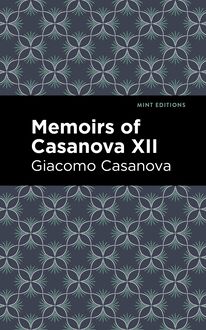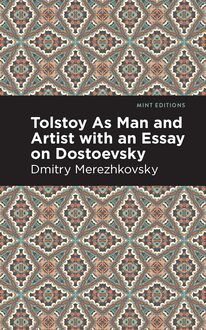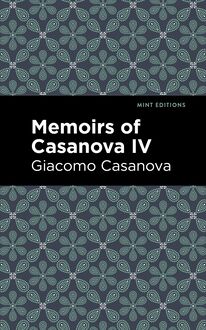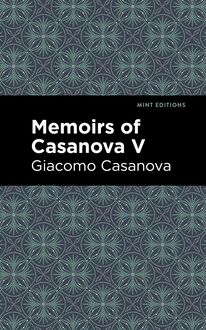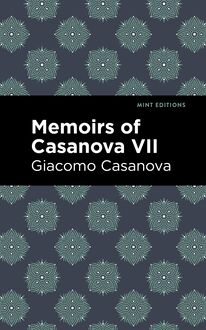-
 Univers
Univers
-
 Ebooks
Ebooks
-
 Livres audio
Livres audio
-
 Presse
Presse
-
 Podcasts
Podcasts
-
 BD
BD
-
 Documents
Documents
-
- Cours
- Révisions
- Ressources pédagogiques
- Sciences de l’éducation
- Manuels scolaires
- Langues
- Travaux de classe
- Annales de BEP
- Etudes supérieures
- Maternelle et primaire
- Fiches de lecture
- Orientation scolaire
- Méthodologie
- Corrigés de devoir
- Annales d’examens et concours
- Annales du bac
- Annales du brevet
- Rapports de stage
La lecture à portée de main
Vous pourrez modifier la taille du texte de cet ouvrage
Découvre YouScribe en t'inscrivant gratuitement
Je m'inscrisDécouvre YouScribe en t'inscrivant gratuitement
Je m'inscrisEn savoir plus
Vous pourrez modifier la taille du texte de cet ouvrage
En savoir plus

Description
Memoirs of Casanova (1792) is the autobiography of Italian adventure and socialite Giacomo Casanova. Written at the end of his life, the Memoirs capture the experiences of one of Europe’s most notorious figures, a man whose escapades as a gambler, womanizer, and socialite are matched only by his unique gift for sharing them with the world. More than perhaps any other man, Casanova sought to emulate the lessons of the Enlightenment on the level of everyday life, a sentiment captured perfectly in the opening sentence of his Memoirs: “I will begin with this confession: whatever I have done in the course of my life, whether it be good or evil, has been done freely; I am a free agent.”Memoirs of Casanova Volume XI finds Giacomo Casanova on the run from Venetian authorities. Having been handed a five-year prison sentence, Casanova is left with no choice but to risk a daring, dangerous escape. He manages to make his way by foot and by gondola out of the city before embarking on a journey to Paris. Arriving in 1757, he reconnects with powerful friends, affording him much needed protection. There, he witnesses the brutal execution of Robert-François Damiens, the attempted assassin of Louis XV, and the last man to be drawn and quartered in France. Desperate for money, he accepts a job from the French Foreign Minister to collect information from the commune of Dunkirk. Having proved himself as a valuable spy, Casanova reinvents himself once more. With a beautifully designed cover and professionally typeset manuscript, this edition of Giacomo Casanova’s Memoirs of Casanova is a classic of European literature reimagined for modern readers.
Sujets
Informations
| Publié par | Mint Editions |
| Date de parution | 07 décembre 2021 |
| Nombre de lectures | 0 |
| EAN13 | 9781513286952 |
| Langue | English |
| Poids de l'ouvrage | 2 Mo |
Informations légales : prix de location à la page 0,0350€. Cette information est donnée uniquement à titre indicatif conformément à la législation en vigueur.
Extrait
Memoirs of Casanova Volume XI
Giacomo Casanova
Memoirs of Casanova Volume XI was first published in 1902.
This edition published by Mint Editions 2021.
ISBN 9781513281933 | E-ISBN 9781513286952
Published by Mint Editions®
minteditionbooks.com
Publishing Director: Jennifer Newens
Design & Production: Rachel Lopez Metzger
Project Manager: Micaela Clark
Translated By: Arthur Machen
Typesetting: Westchester Publishing Services
C ONTENTS I. Count Tiretta of Trevisa Abbe Coste—Lambertini, the Pope’s Niece Her Nick—Name for Tiretta the Aunt and Niece—Our Talk by the Fireside—Punishment of Damien—Tiretta’s Mistake Anger of Madame***—Their Reconciliation—My Happiness with Mdlle. de la Meure Silvia’s Daughter—Mdlle, de la Meure Marries My Despair and Jealousy—A Change far the Better II. The Abby de la Ville—The Abby Galiani—The Neapolitan Dialect—I Set Out for Dunkirk on a Secret Mission I Succeed—I Return to Paris by Amiens—My Adventure by the Way—M. de la Bretonniere—My Report Gives Satisfaction—I am Paid Five Hundred Louis—Reflections III. The Count de la Tour D’Auvergne and Madame D’Urfe—Camille—My Passion for the Count’s Mistress—The Ridiculous Incident Which Cured Me—The Count de St. Germain IV. Absurd Ideas of Madame D’Urfe on My Supernatural Powers—Marriage of My Brother—I Conceive a Plan on His Wedding Day—I Go to Holland on a Financial Mission—The Jew Boaz Gives Me a Lesson—M. d’Afri—Esther—Another Casanova—I Find Therese Imer Again
I
C OUNT T IRETTA OF T REVISA A BBE C OSTE —L AMBERTINI , THE P OPE ’ S N IECE H ER N ICK —N AME FOR T IRETTA THE A UNT AND N IECE —O UR T ALK BY THE F IRESIDE —P UNISHMENT OF D AMIEN —T IRETTA ’ S M ISTAKE A NGER OF M ADAME ***—T HEIR R ECONCILIATION —M Y H APPINESS WITH M DLLE . DE LA M EURE S ILVIA ’ S D AUGHTER —M DLLE , DE LA M EURE M ARRIES M Y D ESPAIR AND J EALOUSY —A C HANGE FAR THE B ETTER
In the beginning of March, 1757, I received a letter from my friend Madame Manzoni, which she sent to me by a young man of good appearance, with a frank and high-born air, whom I recognized as a Venetian by his accent. He was young Count Tiretta de Trevisa, recommended to my care by Madame Manzoni, who said that he would tell me his story, which I might be sure would be a true one. The kind woman sent to me by him a small box in which she told me I should find all my manuscripts, as she did not think she would ever see me again.
I gave Tiretta the heartiest of welcomes, telling him that he could not have found a better way to my favour than through a woman to whom I was under the greatest obligations.
“And now, that you may be at your ease with me, I should like to know in what manner I can be of service to you?”
“I have need of your friendship, perhaps of your purse, but at any rate of your protection.”
“You have my friendship and my protection already, and my purse is at your service.”
After expressing his gratitude to me, Tiretta said,
“A year ago the Supreme Council of my country entrusted me with an employment dangerous to one of my years. I was made, with some other young gentlemen of my own age, a keeper of the Mont de Piete. The pleasures of the carnival having put us to a good deal of expense, we were short of money, and borrowed from the till hoping to be able to make up the money before balancing-day, but hoping all in vain.
“The fathers of my two companions, richer than mine, paid the sums they had taken, and I, not being able to pay, took the part of escaping by flight from the shame and the punishment I should have undergone.
“Madame Manzoni advised me to throw myself on your mercy, and she gave me a little box which you shall have to-day. I only got to Paris yesterday, and have only two louis, a little linen, and the clothes on my back. I am twenty-five, have an iron constitution, and a determination to do all in my power to make an honest living; but I can do nothing. I have not cultivated any one talent in a manner to make use of it now. I can play on the flute, but only as an amateur. I only know my own language, and I have no taste for literature. So what can you make of me? I must add that I have not a single expectation, least of all from my father, for to save the honour of the family he will be obliged to sell my portion of the estate, to which I shall have to bid an eternal farewell.”
If the count’s story had surprised me, the simplicity with which he told it had given me pleasure; and I was resolved to do honour to Madame Manzoni’s introduction, feeling that it was my duty to serve a fellow-countryman, who was really guilty of nothing worse than gross thoughtlessness.
“Begin,” said I, “by bringing your small belongings to the room next to mine, and get your meals there. I will pay for everything while I am looking out for something which may do for you.
“We will talk of business to-morrow, for as I never dine here I rarely if ever come home till late, and I do not expect to have the honour of seeing you again today. Leave me for the present, as I have got some work to do; and if you go out to walk, beware of bad company, and whatever you do keep your own counsel. You are fond of gaming, I suppose?”
“I hate it, as it has been the cause of half my troubles.”
“And the other half, I’ll wager, was caused by women.”
“You have guessed aright—oh, those women!”
“Well, don’t be angry with them, but make them pay for the ill they have done you.”
“I will, with the greatest pleasure, if I can.”
“If you are not too particular in your goods, you will find Paris rich in such commodities.”
“What do you mean by particular? I would never be a prince’s pathic.”
“No, no, I was not thinking of that. I mean by ‘particular’ a man who cannot be affectionate unless he is in love. The man who…”
“I see what you mean, and I can lay no claim to such a character. Any hag with golden eyes will always find me as affectionate as a Celadon.”
“Well said! I shall soon be able to arrange matters for you.”
“I hope you will.”
“Are you going to the ambassador’s?”
“Good God!—no! What should I do when I got there? Tell him my story? He might make things unpleasant for me.”
“Not without your going to see him, but I expect he is not concerning himself with your case.”
“That’s all I ask him.”
“Everybody, my dear count, is in mourning in Paris, so go to my tailor’s and get yourself a black suit. Tell him you come from me, and say you want it by tomorrow. Good bye.”
I went out soon after, and did not come back till midnight. I found the box which Madame Manzoni had sent me in my room, and in it my manuscripts and my beloved portraits, for I never pawned a snuff-box without taking the portrait out.
Next day Tiretta made his appearance all in black, and thanked me for his transformation.
“They are quick, you see, at Paris. It would have taken a week at Trevisa.”
“Trevisa, my dear fellow, is not Paris.”
As I said this, the Abbe de la Coste was announced. I did not know the name, but I gave orders for him to be admitted; and there presently appeared the same little priest with whom I had dined at Versailles after leaving the Abbe de la Ville.
After the customary greetings he began by complimenting me on the success of my lottery, and then remarked that I had distributed tickets for more than six thousand francs.
“Yes,” I said, “and I have tickets left for several thousands more.”
“Very good, then I will invest a thousand crowns in it.”
“Whenever you please. If you call at my office you can choose the numbers.”
“No, I don’t think I’ll trouble to do so; give me any numbers just as they come.”
“Very good; here is the list you can choose from.”
He chose numbers to the amount of three thousand francs, and then asked me for a piece of paper to write an acknowledgment.
“Why so? I can’t do business that way, as I only dispose of my tickets for cash.”
“But you may be certain that you will have the money to-morrow.”
“I am quite sure I should, but you ought to be certain that you will have the tickets to-morrow. They are registered at my office, and I can dispose of them in no other manner.”
“Give me some which are not registered.”
“Impossible; I could not do it.”
“Why not?”
“Because if they proved to be winning numbers I should have to pay out of my own pocket an honour I do not desire.”
“Well, I think you might run the risk.”
“I think not, if I wish to remain an honest man, at all events.”
The abbe, who saw he could get nothing out of me, turned to Tiretta, and began to speak to him in bad Italian, and at last offered to introduce him to Madame de Lambertini, the widow of one of the Pope’s nephews. Her name, her relationship to the Pope, and the abbe’s spontaneous offer, made me curious to know more, so I said that my friend would accept his offer, and that I would have the honour to be of the party; whereupon we set out.
We got down at the door of the supposed niece of the Holy Father in the Rue Christine, and we proceeded to go upstairs. We saw a woman who, despite her youthful air, was, I am sure, not a day under forty. She was rather thin, had fine black eyes, a good complexion, lively but giddy manners, was a great laugher, and still capable of exciting a passing fancy. I soon made myself at home with her, and found out, when she began to talk, that she was neither a widow nor the niece of the Pope. She came from Modena, and was a mere adventuress. This discovery shewed me what sort of a man the abbe was.
I thought from his expression that the count had taken a fancy to her, and when she asked us to dinner I refused on the plea of an engagement; but Tiretta, who took my meaning, accepted. Soon after I went away with the abbe, whom I dropped at the Quai de la Ferraille, and I then went to beg a dinner at Calsabigi’s.
After dinner Calsabigi took me on one side, and told me that M. du Vernai had commissioned him to warn me that I could not dispose of tickets on account.
“Does M. du Vernai take me for a fool or a knave? As I am
-
 Univers
Univers
-
 Ebooks
Ebooks
-
 Livres audio
Livres audio
-
 Presse
Presse
-
 Podcasts
Podcasts
-
 BD
BD
-
 Documents
Documents
-
Jeunesse
-
Littérature
-
Ressources professionnelles
-
Santé et bien-être
-
Savoirs
-
Education
-
Loisirs et hobbies
-
Art, musique et cinéma
-
Actualité et débat de société
-
Jeunesse
-
Littérature
-
Ressources professionnelles
-
Santé et bien-être
-
Savoirs
-
Education
-
Loisirs et hobbies
-
Art, musique et cinéma
-
Actualité et débat de société
-
Actualités
-
Lifestyle
-
Presse jeunesse
-
Presse professionnelle
-
Pratique
-
Presse sportive
-
Presse internationale
-
Culture & Médias
-
Action et Aventures
-
Science-fiction et Fantasy
-
Société
-
Jeunesse
-
Littérature
-
Ressources professionnelles
-
Santé et bien-être
-
Savoirs
-
Education
-
Loisirs et hobbies
-
Art, musique et cinéma
-
Actualité et débat de société
- Cours
- Révisions
- Ressources pédagogiques
- Sciences de l’éducation
- Manuels scolaires
- Langues
- Travaux de classe
- Annales de BEP
- Etudes supérieures
- Maternelle et primaire
- Fiches de lecture
- Orientation scolaire
- Méthodologie
- Corrigés de devoir
- Annales d’examens et concours
- Annales du bac
- Annales du brevet
- Rapports de stage



